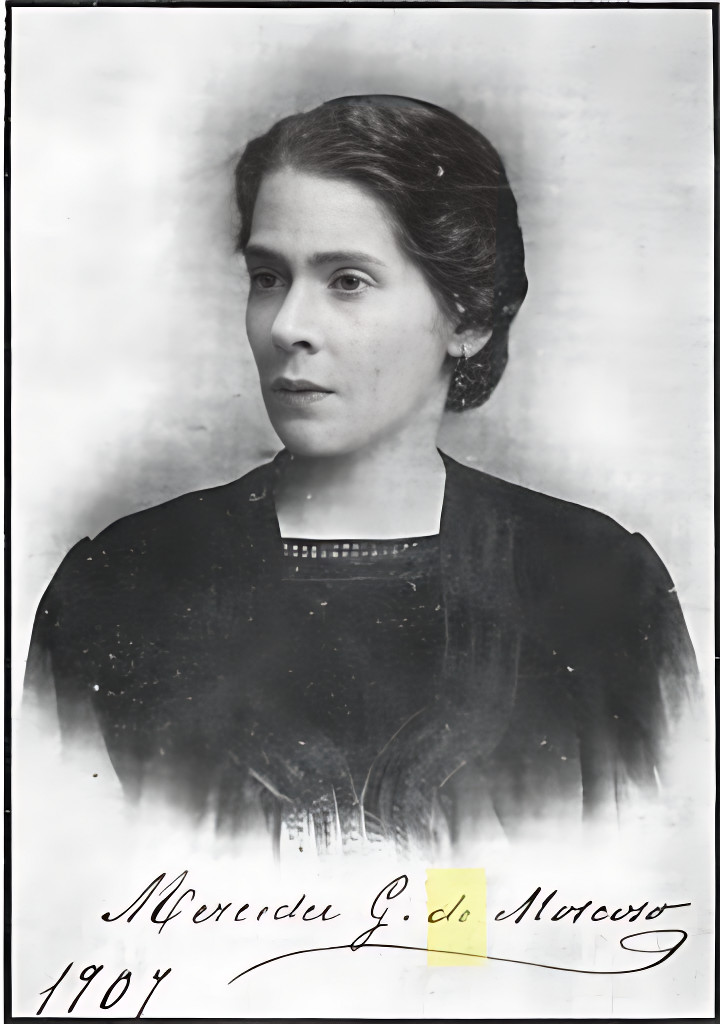Mercedes González de Moscoso (Guayaquil, October 12, 1860 – Quito, November 23, 1911) was a prominent Ecuadorian poet and playwright, considered the leading figure of the country’s second Romantic movement. Her poetry focused on themes of family, motherhood, and domestic life, often expressing a deep melancholic tone shaped by personal loss. Among her most notable works are Reminiscencias (1890), En el Nido (1899), and Cantos del hogar (1909). She also wrote plays, including Martirio sin culpa and an adaptation of her poem Abuela into a three-act play, both produced in 1907. Her work made her an important voice in Ecuadorian literature and feminist circles.
Early Life and Education
Mercedes González de Moscoso, born Josefa Mercedes González Tola on October 12, 1860, in Guayaquil, Ecuador, was the daughter of Nicolás Augusto González Navarrete, originally from Ambato, and Guadalupe Tola Dávalos, a native of Guayaquil. Her father, involved in Ecuadorian politics, was a secret agent for Vicente Rocafuerte in the mid-19th century. When the political turmoil known as the “Degüelle de Jambelí” erupted in 1865, Mercedes and her family were forced to flee to Lima, Peru, where they lived for ten years. This early experience of exile and displacement deeply influenced her melancholic and introspective literary style.
Mercedes inherited a passion for literature from her father and shared this interest with her brother, Nicolás Augusto González Tola, who also became a poet. The family returned to Guayaquil in 1875 after the assassination of Ecuadorian president Gabriel García Moreno. Soon after, Mercedes became an orphan and married her distant relative, Aurelio Moscoso, with whom she moved to Ambato.
Literary Career
González de Moscoso’s literary career flourished during the late 19th century, and she became a prominent figure in Ecuador’s second Romantic movement. Her poetry was characterized by deep sentimentality and an intimate focus on family life. After the tragic loss of her first child, she found solace in her daughter, María, who became a central source of inspiration in her work.
In 1890, upon returning to Quito, she published her first significant work, Reminiscencias, which established her as the literary successor to Dolores Veintemilla de Galindo, an earlier Ecuadorian poet. Her poetry often delved into personal loss, motherhood, and the sanctity of the home, earning her recognition for her delicate and introspective style.
Throughout her career, Mercedes published several notable works, including En el Nido (1899), a heartfelt collection of poems focused on domestic life, and Abuela (1903), a poem dedicated to her grandchildren. Her contributions extended beyond poetry; she also adapted Abuela into a three-act play in 1907, along with her drama Martirio sin culpa. Both plays, despite being praised for their moral messages, were noted for their slow pace and lack of character development.
In 1909, she released Cantos del hogar, a collection of poems that reflected her emotional connection to family and home. Two years later, in 1911, she published Rosas de Otoño, another collection of poems.
Personal Life
Mercedes González de Moscoso’s life was shaped by loss and family devotion. She and Aurelio Moscoso had two children, but their first child died in infancy. Their daughter, María, became the focal point of Mercedes’ affection and creativity. When María married Colonel Carlos Andrade Rodríguez, Mercedes became a devoted grandmother to their three children—Carlos, Aurelia, and Esmeralda.
Her personal life took a tragic turn when she became a widow while living in Costa Rica. Despite financial struggles, she continued to support her daughter and family, sustaining herself through small handicrafts and her poetry.
Later Years and Death
In the early 20th century, Mercedes became involved in feminist circles. In 1905, she contributed to La Mujer, Ecuador’s first feminist magazine, alongside prominent figures like Zoila Ugarte and Dolores Sucre. Her writing in this period addressed the social and personal struggles of women, particularly the conflict between marriage and personal growth.
In 1905, she was appointed director of the National Library of Quito, a significant role for a woman at the time. Her final years were marked by continuous literary output, and her poem Gloria al Obrero (1910) was a tribute to the Chilean working class during the centenary of Chile’s independence.
Mercedes González de Moscoso passed away on November 23, 1911, in Quito, Ecuador. She left behind unpublished Memorias and a profound impact on Ecuadorian literature, particularly as a pioneering female poet.
Legacy and Recognitions
Mercedes González de Moscoso is remembered as one of the leading figures of Ecuador’s second Romantic movement, and her work stands as a testament to the emotional depth and social consciousness of her time. Her poetry, though often centered on family and intimate matters, subtly critiqued the limitations placed on women in 19th-century society. Following her death, a committee in Guayaquil funded the erection of her mausoleum in the city’s general cemetery, further cementing her place in Ecuador’s literary history.
Her brother, Nicolás Augusto, introduced Cantos del hogar with a heartfelt six-page preface, emphasizing her importance in Ecuadorian letters. Despite her relative obscurity outside Ecuador, her work continues to be celebrated for its lyrical beauty and emotional resonance.
Works
- Reminiscencias – Ambato, 1890 (read it for free here)
- En el Nido – Guayaquil, 1899 (poem)
- Abuela (poem) – Quito, 1903, (read it for free here)
- Abuela (play) – Quito, 1907 (read it for free here)
- Cantos del Hogar – Quito, 1909 (poetry) (read it for free here)
- Rosas de Otoño – Quito, 1911 (poetry) (read it for free here)
- Martirio sin culpa – Quito, 1905 (play)
- Nobleza (unpublished play)
Her works have been included in the following anthologies of writers
- Ciencia Ficción Ecuatoriana, vol. 1 (2018)
Name variations
- M.G. de M.
- Mercedes G. de Moscoso
- Mercedes González Tola
- Rosa del Valle
References
- Diccionario Biográfico Ecuador (Web Archive) Retrieval Date: September 27, 2024
- Wikipedia – Mercedes González de Moscoso Retrieval Date: September 27, 2024
- Casa de la Cultura Ecuatoriana Repository – Abuela (1903) Retrieval Date: September 27, 2024

